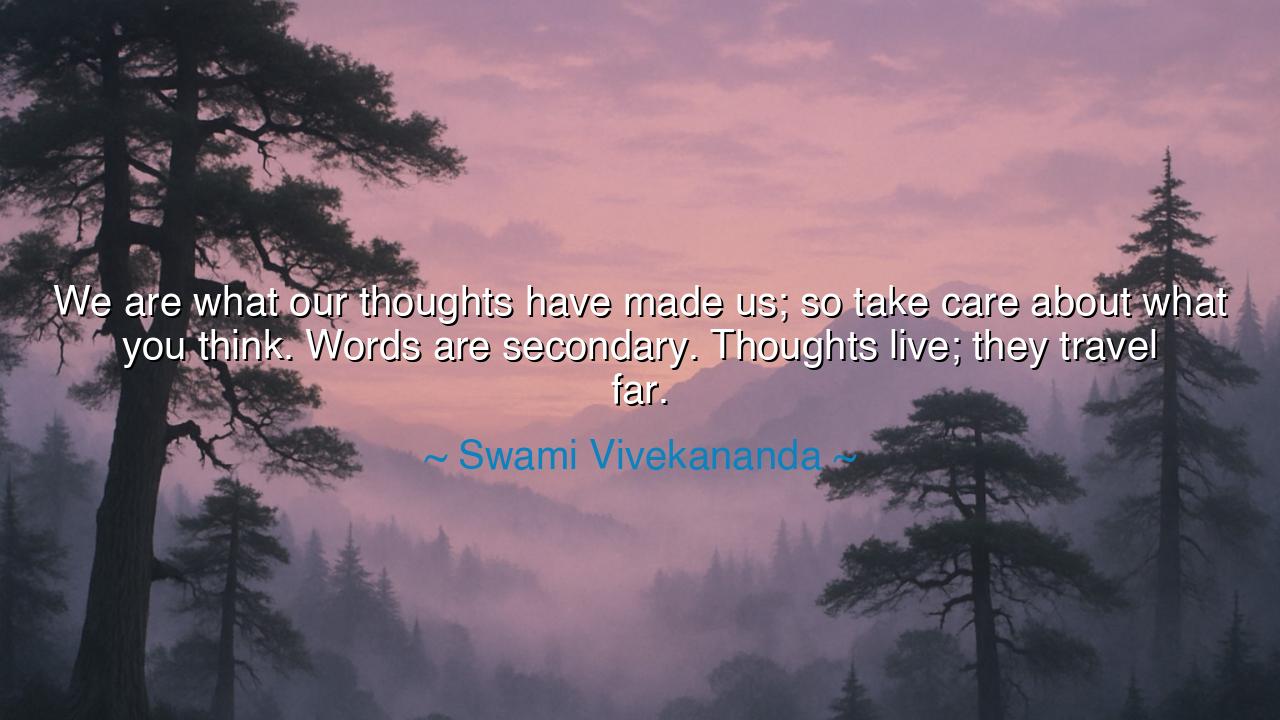
We are what our thoughts have made us; so take care about what
We are what our thoughts have made us; so take care about what you think. Words are secondary. Thoughts live; they travel far.






Hear, O seeker of truth, the immortal words of Swami Vivekananda: “We are what our thoughts have made us; so take care about what you think. Words are secondary. Thoughts live; they travel far.” In these words lies a teaching as old as the Vedas, yet as urgent as the beating of the present hour. For man is not shaped by stone, nor wealth, nor by the judgments of others, but by the thoughts he holds, nourishes, and releases into the world. The unseen currents of the mind are the architects of destiny, and from their quiet forge all deeds are born.
The thought is the seed, the action the sprout, and the character the tree. What one allows to dwell within the mind will, in time, clothe itself in flesh and circumstance. Thus Vivekananda warns us: guard your thoughts, for they are not idle sparks, but forces that mold your very being. Words may echo for a moment, but thoughts endure, pulsing like currents through the unseen ether, influencing not only yourself but others, even those far beyond your reach.
The ancients knew this law. The Buddha himself declared: “All that we are is the result of what we have thought.” And indeed, his journey from prince to sage was not born of outward command, but of the inward flame of contemplation, which grew until it illuminated the world. Similarly, the Stoic Marcus Aurelius wrote in his meditations that “the soul becomes dyed with the color of its thoughts.” These truths, from East to West, converge upon the same revelation: that mastery of the mind is mastery of life.
History gives us examples of this power. Consider Mahatma Gandhi, who, long before India was free, held within his mind the vision of a nation liberated not by violence but by non-violence. His thoughts became conviction, his conviction became action, and his action inspired millions. The British Empire, mighty in arms, was overcome by a weapon invisible yet irresistible: the force of disciplined thought turned into moral strength. Truly, thoughts travel far, farther than armies, farther than empires, and they endure long after bodies perish.
O listener, reflect also on the shadow of this teaching. For just as noble thoughts can uplift, dark ones can destroy. Hatred, when harbored, breeds cruelty; envy, when fed, becomes betrayal; fear, when nurtured, chains the soul. The wars of history were not born first on battlefields but in the minds of men who allowed pride, greed, and division to take root. Thus Vivekananda does not speak in poetry alone—he speaks in warning: guard your inner temple, lest corruption within manifest as ruin without.
The lesson, then, is radiant and clear: cultivate your thoughts as one tends a sacred garden. Uproot weeds of malice, water the seeds of compassion, expose the soil to the sunlight of truth. Do not waste your days chasing empty words or appearances, for these are but echoes. Instead, attend to the living fire of thought, for it is this that shapes your face, your fate, your world.
Practical action follows: begin each morning by watching your thoughts. When anger rises, replace it with patience; when doubt whispers, answer with courage; when despair beckons, remember gratitude. Let your inner life be disciplined, as a warrior keeps his sword sharp. For in the end, your thoughts are not only your companions—they are your destiny, and they will travel far beyond what you can see.
Thus I say to you, in the spirit of Swami Vivekananda: you are the child of your own thoughts. Shape them wisely, honor them greatly, and let them soar nobly. For while words may pass with the wind, thoughts endure like stars—guiding, shaping, and carrying the light of your soul far across the ages.






AAdministratorAdministrator
Welcome, honored guests. Please leave a comment, we will respond soon